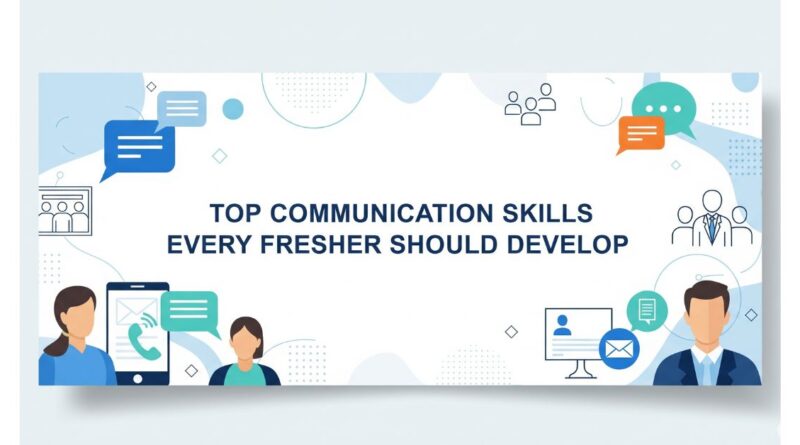Top Communication Skills Every Fresher Should Develop: A Roadmap to Professional Success
Top Communication Skills Every Fresher Should Develop: A Roadmap to Professional Success
Entering the professional world as a fresher can be both exciting and overwhelming. While your technical knowledge and qualifications matter, one of the most underrated yet crucial elements of your success lies in how well you communicate. Whether you’re applying for jobs, attending interviews, working on team projects, or simply networking, strong communication skills are essential.
In today’s highly competitive job market, mastering communication skills for freshers is not optional—it’s a necessity. In this guide, we’ll break down the top communication skills for students and freshers, explain their importance in professional settings, and share actionable tips on how to improve communication skills for freshers—especially those stepping into the IT and tech industry.
1. Why Communication Skills Matter for Freshers
Strong communication is often the bridge between being a good candidate and a great employee. Employers today are not just hiring coders or analysts—they’re hiring collaborators, problem solvers, and team players.
Key Takeaways:
-
Communication is one of the essential soft skills for freshers.
-
It impacts job interviews, workplace collaboration, and career growth.
-
Effective communication enhances your confidence, credibility, and presence.
2. Verbal Communication: Speaking with Clarity and Confidence
Your ability to articulate thoughts clearly during meetings, presentations, or interviews plays a vital role in making a strong impression.
How to Improve Verbal Communication:
-
Practice speaking on topics for 2-5 minutes daily.
-
Join Toastmasters or college speaking clubs.
-
Avoid filler words like “um”, “you know”, “like”.
Key Benefits:
-
Makes your speech more impactful.
-
Boosts your presence in team discussions and interviews.
-
Enhances your communication skills in the workplace.
3. Written Communication: Say More with Fewer Words
As a fresher in tech, you’ll often communicate through emails, reports, chat tools like Slack, or documentation. Your writing should be clear, concise, and professional.
Tips to Improve Written Communication:
-
Use tools like Grammarly or Hemingway Editor.
-
Keep sentences short and avoid jargon.
-
Always proofread before sending.
Key Benefits:
-
Builds trust and professionalism.
-
Prevents miscommunication.
-
Helps convey technical knowledge in an understandable way.
4. Active Listening: The Foundation of Two-Way Communication
Effective communication is not just about talking—listening actively is just as crucial. This involves paying full attention, acknowledging the speaker, and responding thoughtfully.
How to Practice Active Listening:
-
Don’t interrupt while someone is speaking.
-
Ask clarifying questions.
-
Summarize what you heard to confirm understanding.
Why It Matters:
-
Reduces errors and misunderstandings.
-
Builds strong workplace relationships.
-
Essential for team collaboration and learning as a fresher.
5. Non-Verbal Communication: The Silent Influencer
Your body language, facial expressions, posture, and eye contact all convey powerful messages—often louder than words.
Tips for Better Non-Verbal Communication:
-
Maintain eye contact without staring.
-
Sit or stand with good posture to show confidence.
-
Avoid fidgeting or crossing arms.
Why Freshers Should Care:
-
First impressions in interviews often depend on body language.
-
Helps establish confidence and credibility.
-
Aligns well with other soft skills for IT freshers.
6. Public Speaking: From Fear to Fluency
Whether it’s a team stand-up, client presentation, or hackathon pitch, public speaking skills make you stand out.
Tips to Get Started:
-
Start small—speak at college meetups or project demos.
-
Practice in front of a mirror or record yourself.
-
Learn the art of storytelling to keep audiences engaged.
Key Benefits:
-
Increases visibility in teams and events.
-
Prepares you for leadership and managerial roles.
-
Reinforces other top communication skills for students.
7. Empathy and Emotional Intelligence: Understand Before Responding
Empathy means understanding and sharing the feelings of others. In the workplace, it helps you respond better to colleagues, clients, and managers.
Why It Matters:
-
Improves team collaboration.
-
Resolves conflicts smoothly.
-
Builds long-term relationships.
How to Develop Empathy:
-
Be an active listener.
-
Put yourself in others’ shoes.
-
Respond, don’t react—especially under stress.
8. Constructive Feedback: Giving and Receiving Gracefully
As a fresher, you’ll receive feedback—and eventually, you’ll need to give it too. How you handle it reflects your maturity and professionalism.
Tips for Receiving Feedback:
-
Don’t take it personally.
-
Thank the person giving feedback.
-
Use it to improve, not to defend yourself.
Tips for Giving Feedback:
-
Be specific and polite.
-
Focus on behavior, not the person.
-
Offer suggestions for improvement.
9. Email Etiquette: Your Digital First Impression
Emails are often your first line of communication with recruiters, colleagues, or mentors. Clear, professional emails show your attention to detail and communication etiquette.
Email Tips for Freshers:
-
Use a professional tone and structure.
-
Keep it brief and to the point.
-
Use proper greetings, closings, and subject lines.
Why It’s Important:
-
Reflects professionalism and clarity.
-
Avoids delays or miscommunication.
-
Key for remote and hybrid work models in tech.
10. Adaptability in Communication: Know Your Audience
Whether you’re talking to a team lead, HR, or fellow fresher, you must tailor your tone and content accordingly. That’s the mark of truly effective communication.
How to Adapt:
-
Be formal in professional settings, informal with peers.
-
Use simple language when discussing tech with non-tech audiences.
-
Read the room—observe tone, pace, and context.
Why It Matters:
-
Enhances your credibility.
-
Makes you a better team player and communicator.
-
Essential for effective communication for job seekers.
11. Communication in Interviews: Nail the First Impression
When it comes to landing your first job, how you present yourself in interviews is key. Your ability to communicate your strengths clearly can make or break your chances.
Freshers Communication Tips for Interviews:
-
Prepare a 30-second self-introduction.
-
Use the STAR method for answering behavioral questions.
-
Practice mock interviews with peers or mentors.
Key Interview Takeaways:
-
Showcase both technical knowledge and essential soft skills for freshers.
-
Communicate your enthusiasm and career goals.
-
Ask thoughtful questions at the end.
12. Virtual Communication: Mastering Zoom, Slack & Beyond
Remote work is here to stay. Communicating effectively in virtual meetings and messages is a must-have skill for modern IT roles.
How to Excel in Virtual Settings:
-
Speak clearly, avoid interrupting, and mute when not speaking.
-
Use visual cues (nods, smiles) on video calls.
-
Keep messages structured and polite in chat tools.
Why It Matters in Tech:
-
Many companies hire remote interns and employees.
-
Virtual collaboration is a standard in global tech teams.
-
It directly influences your communication skills in the workplace.
13. Continuous Learning: Improving Communication Over Time
Finally, remember: communication is a lifelong skill. The more you practice and seek feedback, the better you become.
Ways to Keep Improving:
-
Read books like “How to Win Friends & Influence People”.
-
Watch TED Talks and analyze their presentation techniques.
-
Take online courses on Coursera or Udemy.
Key Reminder:
“Great communicators are not born—they’re made.”
Final Thoughts
In the tech world, coding may get your foot in the door, but communication skills for freshers will determine how far you go. These skills influence your job prospects, performance, and leadership potential. If you’re serious about a thriving tech career, invest as much in your soft skills for IT freshers as you do in your technical toolkit.
Mastering these top communication skills for students will not just help you land your first job—it will shape your entire professional journey.
Follow us for more Updates: Telugu Careers Hub




